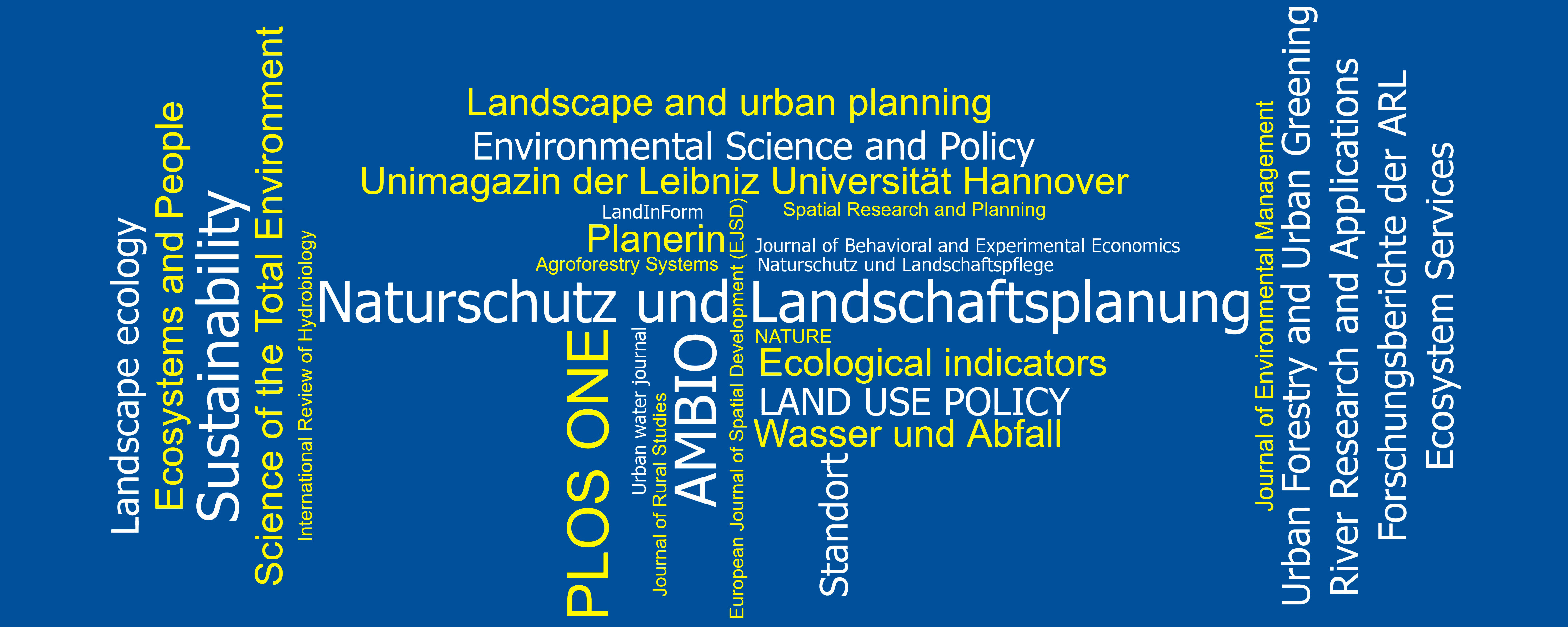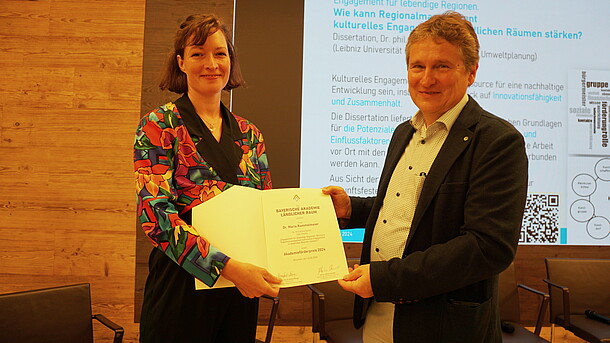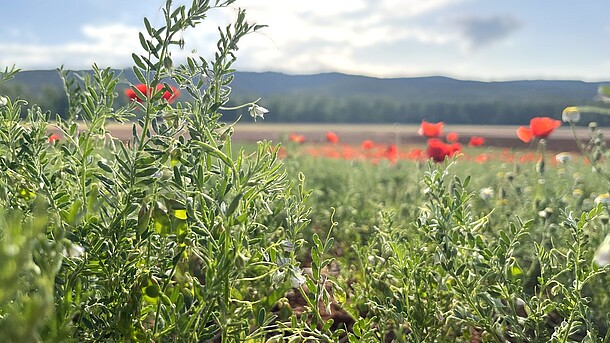Dissertationspreis der Bayerischen Akademie Ländlicher Raum für Dr. Maria Rammelmeier



SUCHE NACH PUBLIKATIONEN
Zeige Ergebnisse 1 - 20 von 1483
2024
Zoch, L., & Reich, M. (2024). Influence of Sphagnum harvesting on arthropod fauna and vegetation with a focus on beetles (Coleoptera) and ants (Hymenoptera: Formicidae). Wetlands ecology and management. https://doi.org/10.1007/s11273-024-10003-6
Krapivnitckaia, P., Kreutzfeldt, J., Schritt, H., Reimers, H., Floeter, C., Reich, M., & Kunz, V. D. (2024). Detection and validation of common noctule bats (Nyctalus noctula) with a pulse radar and acoustic monitoring in the proximity of an onshore wind turbine. PLOS ONE, 19(6 ), Artikel e0299153. https://doi.org/10.1371/journal.pone.0299153
Zitzmann, F., Stern, M., Schmidt, M., & Schirmel, J. (2024). Carabid beetles in solar parks: assemblages under solar panels are severely impoverished compared to gaps between panel rows and edge areas. Journal of Insect Conservation. Vorabveröffentlichung online. https://doi.org/10.1007/s10841-024-00597-w
Yang, L., Liu, J., Albert, C., & Guo, X. (2024). Exploring the effects of soundscape perception on place attachment: A comparative study of residents and tourists. Applied acoustics, 222, Artikel 110048. https://doi.org/10.1016/j.apacoust.2024.110048
Murali, R., Lliso, B., Mannetti, L. M., Filyushkina, A., Amaruzaman, S., Amin, A. M., Hyldmo, H. D. S., Koessler, A. K., Lenzi, D., Lutti, N., & Yiu, E. (2024). Assessing multiple values of nature in National Biodiversity Strategies and Action Plans. People and Nature, 6(3), 1355-1365. https://doi.org/10.1002/pan3.10645
Vollheyde, A.-L., & Haaren, C. V. (2024). Agri-ecological dataset from vegetation surveys on organic legume fields in Tuscany, Italy. Data in Brief, 54, Artikel 110306. https://doi.org/10.1016/j.dib.2024.110306
Vollheyde, A.-L., Navarro, D. R., Pascual, M. D. L. M., Ramírez, M. C. A., Sikora, S., Rajnović, I., Hammami, I., Trabelsi, D., & Haaren, C. V. (2024). Dataset on biodiversity and agronomic performance of lentil and chickpea field trials in the Mediterranean Region. Data in Brief, 54, Artikel 110528. https://doi.org/10.1016/j.dib.2024.110528
Hossain, M. S., Basak, S. M., Amin, M. N., Anderson, C. C., Cremin, E., & Renaud, F. G. (2024). Social-ecological systems approach for adaptation to climate change. Sustainable development, 32(3), 2766-2778. https://doi.org/10.1002/sd.2801
Zitzmann, F. (2024). Bird use of short rotation coppice strips within a modern silvoarable agroforestry system during the winter season: Comparison of different coppice strip variants and hedgerows. Ornithologischer Anzeiger, 62, 18-30.
Hack, J., Gehrmann, S., & Wesemann, M. (2024). Wassersensible Stadtgestaltung: Innovative Klimawandelanpassung mit Regen- und Grauwassermanagement im Forschungsprojekt Resource:Mannheim. fbr-Wasserspiegel, 2024(2), 6-12. Artikel 2. Vorabveröffentlichung online.
Thiele, J., Wiehe, J., & von Haaren, C. (2024). Participation 3.0 in the implementation of the energy transition - Components and effectiveness of an interactive dialogue tool (Vision:En 2040). PLoS ONE, 19(3), Artikel e0299270. https://doi.org/10.1371/journal.pone.0299270
Marchetti, S., Secondi, L., & Vargas Lopez, A. (2024). Comparison of Two Different Approaches to Measuring Economic Vulnerability to Food Insecurity: An Application to Mexico Using Official Data. Social Indicators Research, 172(1), 147-162. https://doi.org/10.1007/s11205-023-03303-6
Chen, Z., Hermes, J., & von Haaren, C. (2024). Mapping and assessing natural soundscape quality: An indicator-based model for landscape planning. Journal of Environmental Management, 354, Artikel 120422. https://doi.org/10.1016/j.jenvman.2024.120422
Schulze, C., Zagórska, K., Häfner, K., Markiewicz, O., Czajkowski, M., & Matzdorf, B. (2024). Using farmers' ex ante preferences to design agri-environmental contracts: A systematic review. Journal of Agricultural Economics, 75(1), 44-83. https://doi.org/10.1111/1477-9552.12570
Zoch, L., Budig, S. N., & Reich, M. (2024). Sphagnum cultivation sites as habitat for beetles (Coleoptera) and the effect of vegetation structure on species occurrence and abundance. Journal of Insect Conservation, 28(1), 75-88. https://doi.org/10.1007/s10841-023-00524-5
Hack, J., Ojeda-Revah, L., Rubí, M. P., Pradilla, G., Borbor-Cordova, M., Burgueño, G., Eleuterio, A. A., Rivera, D., & Vásquez, A. (2024). Avances de infraestructura verde urbana para la gestión de agua en América Latina. Cuadernos de Geografía: Revista Colombiana de Geografía, 33(1), 139-160. https://doi.org/10.15446/rcdg.v33n1.101947
Greinke, L., & Mehnen, N. (2024). Urban Transformation through Public Participation: A Comparative Study of Thessaloniki (Greece) and Hanover (Germany). pnd, 2024(1), 41-62. https://doi.org/10.18154/RWTH-2024-03987
Pätzke, F., Schulze, C., Hack, J., Castro-Arce, K., Neumann, V. A., & Schröter, B. (2024). Attitudes of political-administrative decision makers towards the implementation of nature-based solutions in water management–a case study on a hypothetical constructed wetland in the Tárcoles River basin. Ecosystems and People, 20(1), Artikel 2339228. https://doi.org/10.1080/26395916.2024.2339228
Reichenspurner, M., Barghusen, R., & Matzdorf, B. (2024). Exploring farmers’ perspectives on collective action: a case study on co-operation in Dutch agri-environment schemes. Journal of Environmental Planning and Management, 67(8), 1830-1851. https://doi.org/10.1080/09640568.2023.2183111
2023
Hack, J., Perez Rubi, M. A., Beissler, M., Sandoval, A. O., & Bonilla Brenes, J. R. (2023). Implementing Nature-based Solutions and Green Infrastructure for Cities, Citizens and Rivers - The SEE-URBAN-WATER Project. Forschungsdaten-Repositorium der LUH. https://doi.org/10.15488/15438
Mitarbeiter:innen am Institut für Umweltplanung veröffentlichen auch Datensets zu ihren Publikationen und Forschungsprojekten. Unter dem Link gelangen Sie zum Forschungsportal der Leibniz Universität Hannover, das diese Datensets auflistet und zu den Speicherorten im Web verlinkt. Die Datensets sind in der Regel frei zugänglich (open access).





